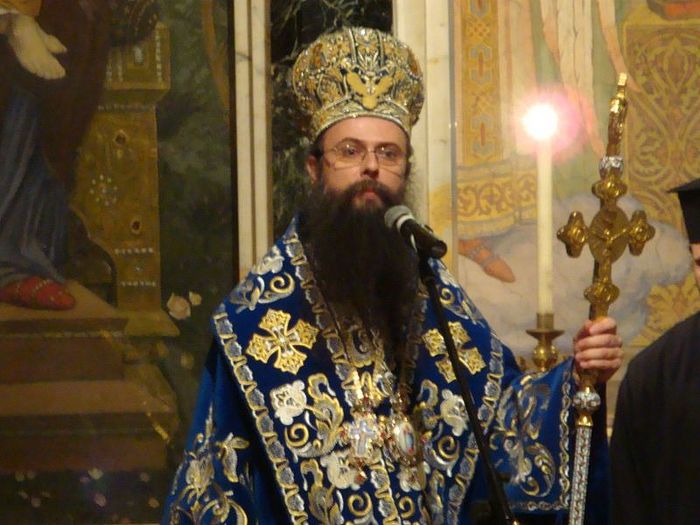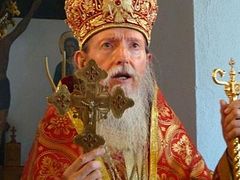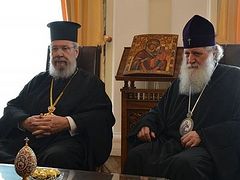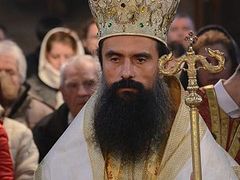Plovdiv, Bulgaria, October 11, 2019
A delegation of the Russian Orthodox Church, headed by Metropolitan Hilarion of Volokolamsk, the head of the Department for External Church Relations, visited Bulgaria on Wednesday and Thursday to attend a conference in Veliko Tarnovo on the history of the Bulgarian and Russian Churches.
On October 2, the hierarchs of the Bulgarian Church received invitations to gather and welcome the Russian delegation in the Synodal Chamber in Sofia on October 9. However, at least one bishop had resolved not to attend.
In a statement published on the official site of the Bulgarian Patriarchate yesterday, His Eminence Metropolitan Nicholas of Plovdiv explained his reason for abstaining from the gathering.
Upon receiving the invitation, Met. Nicholas felt some uneasiness, as he writes, because it is not customary for guests from fraternal Local Churches, who visit quite often, to be welcomed by the Holy Synod in full, “if not required by extremely important circumstances.”
“I have not heard that any of us visited the diocese of a fellow metropolitan in another country and was received by the Holy Synod of the given Local Orthodox Church, in full, headed by the patriarch!” Met. Nicholas writes. Such an occurrence would be more than just a welcoming, but a sign to the entire Orthodox world, he writes, and thus, based on normal episcopal protocol, Met. Nicholas informed His Holiness Patriarch Neofit that he would not be in attendance.
In any event, as Met. Nicholas informs, the plans were changed and the delegation was received simply by Pat. Neofit. “I say, ‘Thank God!’” the Bulgarian hierarch responded, “because otherwise we would not be able to convince anyone that the Bulgarian Orthodox Church is not dependent and does not give in to pressure,” referring to the ongoing Ukrainian crisis. The Bulgarian Synod is among those that have not made any official statement on the matter, though individual hierarchs have made their position clear.
However, Met. Nicholas clarifies: “I ask that I be understood correctly; in this case it is not about disrespect for His Eminence Metropolitan Hilarion of Volokolamsk and the accompanying clergy of the Russian Orthodox Church. Each of us has met Metropolitan Hilarion many times, and I believe that he has no reason to doubt our brotherly feelings towards him personally.”
The point is, the bishop of Plovdiv writes, that the situation in the Orthodox world is tense right now, and fears of a schism are not at all unfounded. “The worst thing would be if tensions between the Moscow and Ecumenical Patriarchal thrones were transformed into tensions within individual Local Orthodox Churches,” he believes.
The question of whether to recognize the Constantinople-created “Orthodox Church of Ukraine” is put before the Bulgarian Holy Synod repeatedly, Met. Nicholas writes, and different countries are insisting that the hierarchs urgently make a pronunciation, placing heavy emphasis on what the Bulgarian Church decides.
Such insistences and tension create a feeling among the laity that the Synod will make a decision that is simply in favor of one of the “sparring parties,” made under external pressure and as a result of lobbying and warring factions within the Bulgarian Synod itself, rather than one dictated by the Holy Spirit and in accordance with the spirit and letter of the sacred canons, Met. Nicholas fears.
“Personally, I am convinced that the Holy Synod of the BOC will decide on the ‘Ukrainian question’ when the time comes, and then it will be dictated by the Holy Spirit and will be correct and worthy of our Church,” the Plovdiv hierarch continues.
In the meantime, to dispel the notion that the Synod will act under pressure “will require systematic, consistent, and principled actions, by which it will be possible to convince the Orthodox people of Bulgaria that the patriarch and metropolitans of the BOC firmly defend Orthodox dogmas and canons … that for the BOC dogmas and canons are not and will never be the subject of a deal.”
The timing of the announcement of a decision of the Bulgarian Church should coincide, Met. Nicholas believes, with the Bulgarian Church’s position in the diptychs of the global Church, noting that for the Patriarchate of Constantinople, the Bulgarian Church is given the 8th place, while for the Russians it is given the 9th.
“Let us assume,” he writes, that the Russian Church, which received Orthodoxy thanks to missionaries from the Bulgarian Church, “will hear our position only after all the other Patriarchates it has put in its diptychs before the Bulgarian Patriarchate speak.”
His Eminence Metropolitan Nektarios of Corfu of the Greek Orthodox Church also recently argued that the Churches that are higher in the diptychs should voice their opinions before the Greek Church does.
Of course, despite such questions, “all Local Churches are equal to one another, and none is more important or meaningful than the others, with each Church able to communicate its position at any time it deems fit.”
“If someone believes that our opinion is important and should be heard urgently, they should be invited to remember that the Bulgarian Orthodox Church has been autocephalous since 927. If he does not remember it, then our position is not so important to him, and he will wait, as we will humbly wait our turn, as we are destined to,” Met. Nicholas writes, adding, “I am sure that all other Local Orthodox churches will treat this procedural position of the BOC with full understanding.”
The Bulgarian hierarch continues with a jab at both the Russian and Constantinople Churches, displaying his displeasure at how the Bulgarian Church is treated on the international Orthodox stage: “I am sure that this understanding will be shown by the Ecumenical Patriarchate and the Russian Orthodox Church, whose primates we have always shown respect, respect and brotherly love, and who, in turn, have not missed a single opportunity to show us where, in their opinion, our place is.”
Further, to solve the Ukrainian issue, it is first necessary to put Christian love into action, he writes. “The so-called ‘Ukrainian question’ is the question of whether we love our Ukrainian brothers in Christ precisely as Christians. Or are we ready to turn the Church-administrative question into a theological and canonical problem because of any political considerations of a secular, temporary nature?”
The Bulgarian Church should be especially sensitive in this regard, Met. Nicholas writes, and therefore it would be better to allow the senior Local Churches “the time necessary to reflect on the importance of love in Church life.”
The hierarchs of the Bulgarian Church have had meetings with various hierarchs of other Local Churches, but at this time, what is most necessary is to come to a consensus on the basis of procedure, Met. Nicholas believes. Thus, each Bulgarian hierarch can tell whomever he is meeting with about the procedural obstacle of the diptychs, “which does not allow us to have a leading opinion.”
Thus, for the time being, the Bulgarian hierarchs should not take sides he believes, lest the Orthodox faithful, “who are also tempted by the enemies of the Church,” begin to think that their hierarchs are dividing against one another.
Certain Bulgarian hierarchs have spoken out on this issue, most notably Metropolitans Gabriel of Lovech, John of Varna, and Daniil of Vidin, who urged the Synod to call for a pan-Orthodox council to resolve the Ukrainian matter, though the Synod resolved to create a commission to study the matter instead, at Met. Nicholas’ proposal. Metropolitan Joanikii of Sliven has specifically banned members of the “Orthodox Church of Ukraine” from communing in his diocese.
Met. Daniil later wrote a fiery letter to the hierarchs of the Greek Church, making a case against Constantinople’s actions in Ukraine, though the Synod subsequently distanced itself from this letter.
The Bulgarian hierarchs have made worthy decisions in recent years, Met. Nicholas writes, that demonstrate that they “stand firmly on the Orthodox faith,” including their decision not to attend the Crete Council and their decision not to attend any religious services with Pope Francis during his recent visit to Bulgaria.
He is sure that the Bulgarian Church will again make the proper decision in the proper time, showing that it does not matter how “great” a Church is, but how firmly it adheres to truth.
“They may consider us small and poor, but the fact that we are a small and poor Church does not prevent us from having dignity, defending the dignity of the Bulgarian Orthodox Church-the Bulgarian Patriarchate and demanding that it be treated with the same respect with which we have ever treated everyone else,” he writes forcefully.
In conclusion, he writes: “Let us give the Holy Spirit time to decide on the ‘Ukrainian question’ what is best for the One, Holy, Ecumenical, and Apostolic Church and what is soul-saving for the Orthodox peoples. And let us use this same time to work to strengthen the authority and dignity of the Bulgarian Orthodox Church-the Bulgarian Patriarchate.”
In February 2017, before the Ukrainian crisis became so acute as it is today, with the creation of the creation of the “Orthodox Church of Ukraine” and the granting to it of a tomos of autocephaly, Met. Nicholas reflected upon the person of His Beatitude Metropolitan Onuphry of Kiev and All Ukraine, the primate of the canonical Ukrainian Church:
Vladyka Onuphry is the Orthodox and canonical bishop who walks along the path of faith and eternal salvation with fear of God in his life and service. He is a man who always has the image of our supreme Shepherd the Lord Jesus Christ in view, and serves Him faithfully. It’s not just my opinion, but that of the whole Bulgarian Orthodox Church and the opinion of the Bulgarian Orthodox people…
In recalling Vladyka Onuphry, the first image that arises in my heart is that of a man of prayer. Thank God that the Ukrainian Orthodox people have such a primate, a holy man of peaceful spirit and a serious man of prayer. Metropolitan Onuphry has very strong prayer. I am sure of this.




